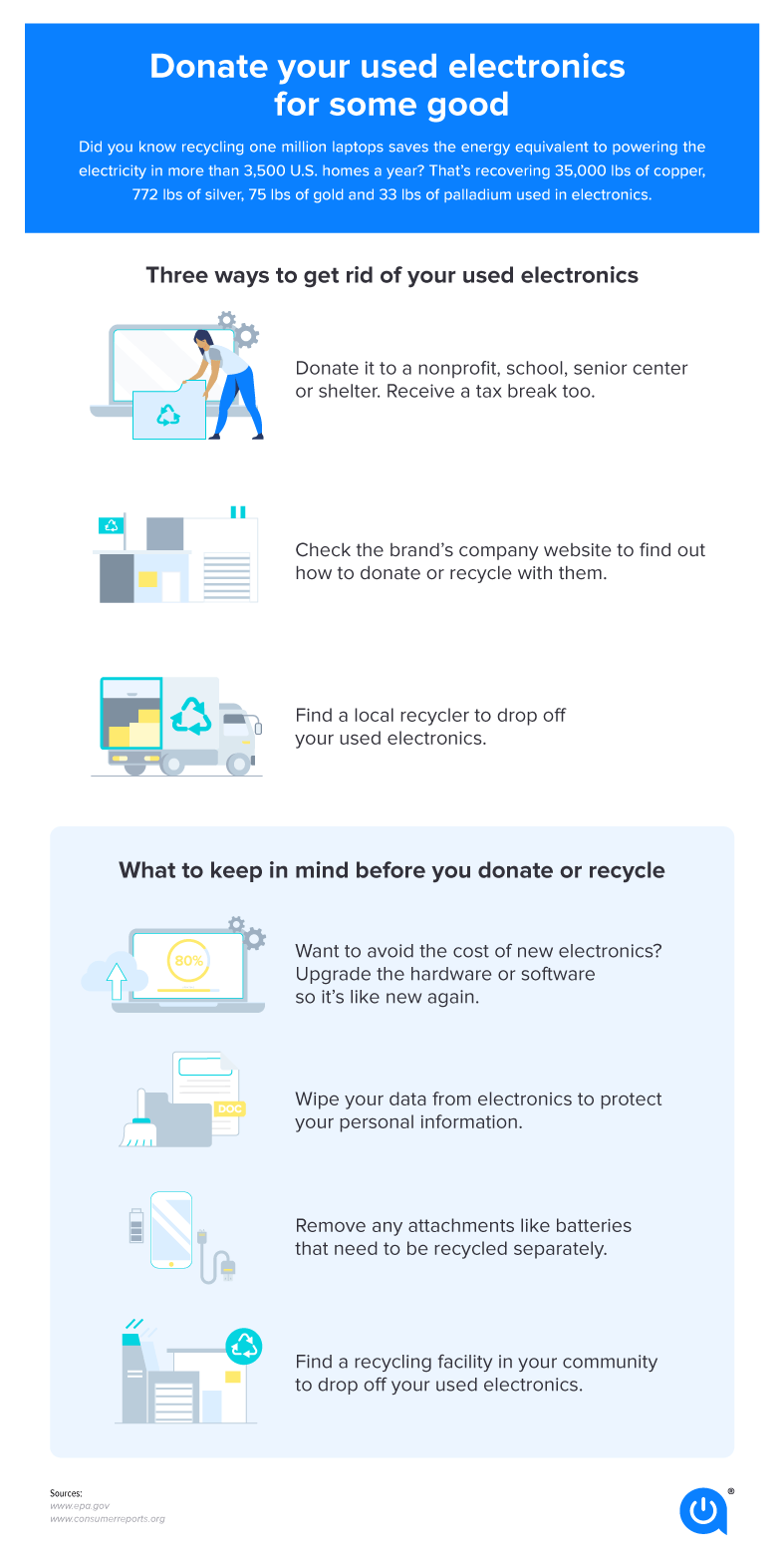With new tech electronics and gadgets always on the horizon, you may be wondering “What do I do with my old device?” Because electronic devices contain toxic substances like lead, mercury and cadmium, it’s not as simple as just throwing them in the trash. In fact, 25 states have passed laws requiring people to recycle old electronics.
Fortunately, there are plenty of nonprofits around the country that accept donations of electronics. Here’s everything you need to know to recycle electronics, including donating or selling your old cellphones, laptops and other devices.
Why you should not throw away old electronic devices?
E-waste is considered hazardous and should never just be tossed into the garbage. Donation or recycling are the two preferred options. In some states, it is illegal to simply throw out your old electronics.
E-waste “contains multiple known and suspected neurotoxicants, including lead and mercury, that may disrupt the development of the central nervous system during pregnancy, infancy, childhood and adolescence. Some harmful toxicants from e-waste may also impact the structural development and function of the lungs,” reports the World Health Organization.

Why should you donate or recycle your old technology?
In many states, it’s the law. It’s also no secret that we love our gadgets. Every year, hundreds of new products come out with new and improved features, and most of us are eager to try them out. All that new tech means the old models have to go somewhere, usually to a landfill. A United Nations study found that in 2019, only 17% of electronic devices were disposed of properly.
Fortunately, there are simple steps all of us can take to reduce the carbon footprint of our technology. According to the EPA, recycling one million laptops saves the energy equivalent to the electricity used by more than 3,500 U.S. homes in a year. Donating to organizations that refurbish technology is also a great way to get your old devices to people who need them the most.
Where to donate electronics
If you’re asking, “Where can I donate electronics near me” and if your device still works, there are a number of charities and nonprofits around the country that will put it to good use. In most cases, these organizations refurbish your old devices and distribute them to people in need. You can also deduct these donations from your taxes, so remember to get a receipt.
Where to donate used computers
There are a number of options for donating your old computer, but the requirements vary from organization to organization. Some will only take computers in good working condition, while others will accept them whether they are functional or not. Before you decide on a place to donate, make sure you check their requirements.
- InterConnection: This electronics recycler collects used electronics and distributes them for charitable use. They accept just about everything you can think of, and items don’t have to be in working condition. They’ll even wipe the data for you for free.
- PCs for People: PCs for People will pick up electronics from businesses and organizations for free in Minnesota, Colorado, Missouri, Maryland, Ohio, Illinois and surrounding states. You must make a minimum donation of 15 computers. In addition to distributing computers to low-income families and nonprofits, they also recycle electronics themselves.
- National Cristina Foundation: This foundation accepts donations of computers and other technology and donates them to nonprofit organizations. Both individuals and organizations are welcome to donate.
- World Computer Exchange: Unlike most of the organizations listed, the World Computer Exchange operates in 53 developing countries around the world to help students learn digital literacy skills. You can drop off computers and equipment at a WCE center near you, or ship them directly to their Boston chapter.
- Donation Town: This resource helps connect charities to people who have clothing and other household goods they’re looking to donate, including computers and technology. You just put in your ZIP code and it shows you which organizations will pick up donations in your area.
- Goodwill: Everyone knows about donating clothes to Goodwill, but they also accept electronics. Just make sure all of your data is wiped before you take it in.
- The Salvation Army: You can donate cellphones, laptops, computers and other electronic devices at any Salvation Army center. You’ll want to erase all your data before you make your donation, though.
You can also look into your local organizations like schools, youth clubs, senior citizen centers, shelters, thrift stores and disaster relief organizations to donate old computers.
Where to donate used phones
Phones are the electronic devices that many of us go through the fastest. According to Gartner, a tech research company, more than 1.5 billion cellphones will ship in 2021 — around 1 for every 5 people in the world. Fortunately, many charities will refurbish your old phone and put it to good use.
- 911 Cell Phone Bank: This organization works with over 1,500 law enforcement and victim services agencies to distribute emergency cellphones to vulnerable people around the country. They’ll even pay for shipping for you to send in your phone.
- Cell4Pets: This business will pay you for your old phone, but a portion of the sale will be donated to North Shore Animal League America, the world’s largest no-kill rescue and adoption organization.
- Cell Phones for Soldiers: This nonprofit provides free cellphone service and emergency funding to active-duty military members and veterans. They accept all types of phones from any carrier, and you can ship it or drop it off at one of their locations.
- eBay for Charity: This works just like regular eBay, but a portion of your sale goes to a charity of your choosing. You can even pick the exact percentage that you want to donate.
- Goodwill: Like computers, Goodwill will accept any phones you’re looking to donate, too.
- Medic Mobile: Medic Mobile accepts all phones, whether they’re working or not. You print a free shipping label and send it to them, and they either refurbish it and sell it or recycle it. The value of the phone is then used to build open-source software for community health.
- National Coalition Against Domestic Violence: Through a partnership with Cellular Recycler, the NCADV accepts donated electronics like cellphones, laptops and video game systems and receives a portion of the sale when they’re refurbished and sold.
- Secure The Call: This nonprofit focuses on providing phones so that people can make 911 calls. You ship your phone and they send it to agencies, companies and institutions who get phones to electronically isolated people around the country.
- Veterans Advantage: Send Veterans Advantage your old phone, and they’ll recycle it and use the donations to provide benefits to active duty, veterans, guards, reservists and family members.
Where to donate used TVs, game systems and other electronics
Electronics like TVs and game systems aren’t quite as easy to donate as phones and computers, but there are still several organizations who will put them to good use.
- eBay for Charity: Anything you can sell on eBay, you can sell on eBay for Charity, including TVs, game systems and other electronics. You can choose from a number of different charities to donate to, and whatever percentage you pick from your sale will go straight to it.
- Goodwill: Like phones and computers, Goodwill will also take any other electronics you’re looking to donate.
- The Salvation Army: One of the largest charities in the country, the Salvation Army accepts TVs and game systems, but the TV must be less than five years old.
- Family shelters: Many local family shelters may accept your electronics, but you’ll have to check with them individually.
Where to recycle used electronics
There are a number of local, regional and national nonprofits that collect and recycle electronics and other devices as well as many refurbishing centers that will rehab your device to be used again. There are three main options for recycling used electronics:
Each of these organizations allow you to safely recycle your old phones, tablets and computers. Chances are there are options right in your backyard, too. Look for local options by entering your ZIP code and the product you want to recycle at the Computer Technology Association’s Recycle Locator or Earth911’s extensive recycling database. Simply Googling your city or county and “recycle electronics” is also an easy way to see what’s available in your area.
Use a tech company’s recycling program
Many of the major tech companies and sales centers now offer their own recycling programs. Here’s a list of some of the biggest programs, but be sure to check the manufacturer’s website to see if they offer a program.
What to know before recycling used electronics
- Delete your personal information: No matter what, your device probably has some sensitive information on it. Make sure you securely wipe your computer, phone or tablet before donating or recycling it.
- Remove the battery: The EPA recommends taking batteries out of your device when possible, as they may need to be recycled separately.
- Consider an update instead: You can often get the same benefits of a new computer with a hardware or software update.
What about my personal information?
Before you recycle your old cellphones, laptops, tablets and more, you’ll want to remove all aspects of your personal data from the devices. It’s not enough to just take out a SIM card or delete all the apps. Here’s what you need to know:
- Personal computers: The most secure solution is to physically remove your old hard drive and then either install it in your new computer or use it for backup. If you don’t want to hang on to the hard drive, you can do a secure wipe of the machine.
- Smartphones: For most phones, you’ll want to erase all content and settings and then do a factory reset to ensure all of your data is removed. Follow these instructions for removing your personal information from an Android, Blackberry, iPhone or Pixel phone.
- Tablets: Similar to smartphones, you’ll want to erase all content before doing a factory reset. Follow these instructions for removing your personal information from an Android tablet or iPad.
- Gaming consoles: Like your computer, the most secure solution is to remove the hard drive. If not, the next best option is to remove any media cards and then do a factory reset of the device.
Allconnect: Let us compare providers for you
Why should you choose Allconnect? We’re the #1 broadband marketplace in the U.S, meaning you can trust us to search, compare and order internet and TV service for your home.
Get started

Written by:
Joe SupanPrincipal Writer, Broadband Content
Joe is a senior writer for CNET covering home technology and broadband. Prior to joining CNET, Joe led MYMOVE’s moving coverage and reported on broadband policy, the digital divide, and privacy issues for the br…
Read more
Edited by:
Robin LaytonEditor, Broadband Content
-
Featured
![A guide to internet resources for Native Americans]() A guide to internet resources for Native Americans Camryn Smith — 4 min read
A guide to internet resources for Native Americans Camryn Smith — 4 min read -
Featured
![Tips to secure and protect your smartphone]() Tips to secure and protect your smartphone Robin Layton — 4 min read
Tips to secure and protect your smartphone Robin Layton — 4 min read -
Featured
![Digital divide: Organizations that are helping bridge the gap]() Digital divide: Organizations that are helping bridge the gap Joe Supan — 5 min read
Digital divide: Organizations that are helping bridge the gap Joe Supan — 5 min read
Latest
-
Thursday, July 25, 2024
Worried about losing your signal? This is how to keep your satellite dish cleanDavid Anders — 6 min read
-
Tuesday, July 23, 2024
The best free TV and movie streaming services 2024Camryn Smith — 5 min read
-
Tuesday, July 23, 2024
Everything you need to know about internet speedsRobin Layton — 8 min read






